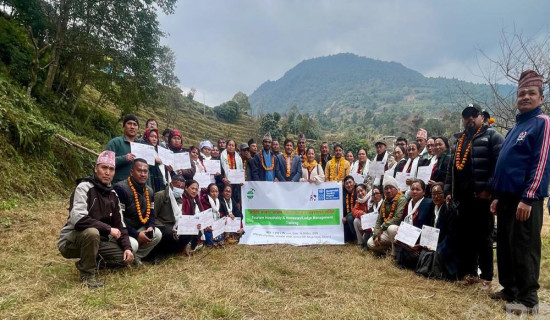- Sunday, 21 December 2025
Combating Unemployment And Poverty
Unemployment is a significant challenge facing the country, with millions of individuals unable to find work. Some of them stay without decent work at home and some are forced to migrate to foreign lands. When people do not work and earn, they cannot meet their basic needs. This is where different dimensions of poverty are born. The impact of unemployment on poverty is substantial, as it limits people’s access to basic necessities such as food, shelter and healthcare. It is a serious detriment for improving the living standard of an individual, a family and the nation as a whole. This article is an attempt to explore the relationship between unemployment and poverty in Nepal. It highlights some of the challenges and possible solutions to this critical contemporary issue.
Although labour surveys show relatively low level of unemployment in Nepal, there is a high rate of unemployment in the country. The low level is just the production of the use of narrow definition of employment and its status in the surveys. The true extent of unemployment should be understood from the figures of passport application, labour permits for foreign employment and applications for various public and private sector job advertisements. The pace of job creation is rather low, owing to low capital spending by government and low investment by the private sector. The loss of jobs, caused by earthquake, economic blockade and COVID-19 pandemic in the last decade, has exacerbated an already dire situation.
Demographic dividend
The true victims of low job creation and losses of existing jobs have been the young people. This has pushed them out of the country either for further studies or for employment. In both cases, Nepal’s demographic dividend is enjoyed by other countries. Studies have revealed that unemployment is a leading cause of poverty in Nepal. This has forced many individuals to be unable to afford basic necessities such as food, shelter, proper education, healthcare and other absolutely essential services. The country's high unemployment and underemployment situation has resulted in a slow pace of reduction in various dimensions of poverty. Poverty reduction target largely remains unrealised. There is also inadequate innovation in the measurement of poverty in the changed situation where people’s consumption patterns have significantly altered. If such a more realistic measure is applied, the extent and depth of poverty may appear otherwise.
Unemployment also breeds inequality. Many scholars have considered inequality as another dimension of poverty. Indeed, unemployment has given rise to a widening income gap between the rich and the poor. The share of income and wealth of the wealthiest 20 per cent of the population is far higher than the poorest 20 per cent. Data also shows that the labourers’ share of income is also declining over the years, suggesting a class division as stated in communist literature. Such an inequality is a social disease as it seriously undermines social cohesion which is a crucial pre-condition for inclusive development. Studies have also demonstrated that inequality and economic growth and negatively related; higher the inequality, lower the economic growth.
It is essential to understand the drivers of unemployment. First, education is a critical factor in reducing joblessness because individuals with technical and higher levels of education are more likely to find work and derive higher pay. Educated families are also better managers in financial management and better decision-makers in other crucial family matters. This ensures their higher mobility. However, the education system demands fundamental reforms. The current system faces numerous challenges, including inadequate funding, a shortage of qualified teachers and inadequate physical and other teaching-learning infrastructures. We have also lost the nature-culture mixture of our ancient root of true education which was capable of boosting our spirit and fulfilling our material needs.
It is disappointing to observe that many young people leave school without obtaining the skills and knowledge needed to find employment in the labour market. Our reliance on foreign labour for technical work is increasing. Technical schools are not getting adequate number of students. This is clearly going to perpetuate the already existing cycle of poverty, inequality and unemployment. Addressing these challenges requires full incentive structures and concerted effort by the government and the private sector to invest in education and skills development.
Promoting SMEs
Second factor for tackling unemployment is to grow small and medium-sized enterprises (SMEs). This sector has the potential to play a significant role in reducing unemployment. SMEs can become a vital source of job creation across the country through value chain and backward and forward linkages in production process. They can reduce trade deficit and give a boost to economic nationalism which was the strategy of many of today’s developed countries while they were in their early developmental stage. However, SMEs face numerous challenges, including bad governance, limited access to funding, inadequate infrastructure, and a lack of skilled labour.
It is frequently heard that establishing and running an industry in the country is an arduous task. This is proved by the fact that many domestic manufacturers have become traders to earn easy and quick profits at the cost of domestic employment. Addressing these real challenges requires a multi-faceted approach that includes providing SMEs with access to finance, improving infrastructure, and investing in skills development. A healthy industrial environment is required. Supporting SMEs can also help to reduce inequality by creating more opportunities for individuals from disadvantaged backgrounds. This also utilises our ancient manufacturing knowledge and skills.
(Dr. Bhusal is an expert in poverty, employment and social protection.)











-(1)-original-thumb.jpg)




